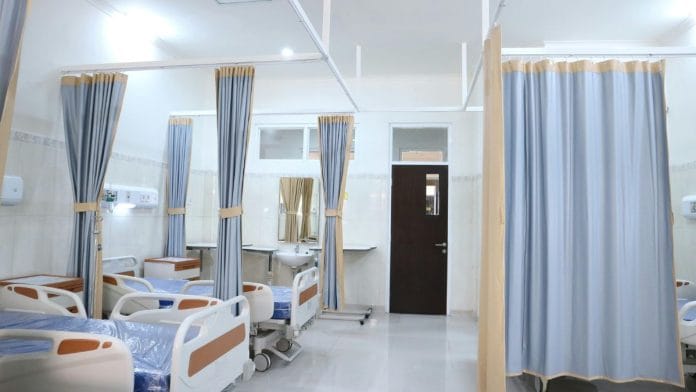New Delhi: Peeved at the extremely sluggish rate with which healthcare facilities in India are opting for full-fledged accreditation, the country’s top accreditation body for hospitals is set to fix a deadline for converting entry-level certification to full accreditation, ThePrint has learnt.
According to latest data shared by the National Accreditation Board for Hospitals and Healthcare Providers (NABH), only 1,435 hospitals with 50-plus beds each or more and 1,056 facilities with a capacity of less than 50 beds each have been accredited so far.
Nearly 2,659 hospitals with more than 50 beds, including the All India Institute of Medical Sciences (AIIMS) in New Delhi, have only entry-level certification. Surprisingly, the number of facilities with less than 50 beds which have this accreditation is 9,875.
Accreditation of hospitals—seen as an assurance of quality service and high standards of patient safety—is voluntary, but governments incentivise facilities that are accredited through various health insurance schemes.
In 2016, statutory insurance regulator Insurance Regulatory and Development Authority of India (IRDAI) had said that all 33,000 hospitals empanelled with it should have entry-level NABH certification.
There is no government data on the total number of hospitals in India, but some industry estimates suggest that there are about 45,000 hospitals with over 50 beds each. When smaller nursing homes are included, the number goes up to nearly 100,000.
The NABH was formed under the Union Ministry of Commerce and Industry’s Quality Council of India (QCI) in 2005 to establish and operate accreditation programmes for healthcare organisations in India.
Before granting them accreditation, the board assesses hospitals on over 600 parameters, which are classified as patient-centred or organisation-centred.
The QCI launched a web portal called Healthcare Organizations Platform for Entry Level Certification (HOPE) in 2014 to provide entry-level certification to healthcare facilities.
“We get nearly 300-350 applications for entry-level certification every month but the applications for accreditation is barely 30 every month. It is also concerning that a large number of hospitals with HOPE do not want to go for full accreditation even after years,” Atul Mohan Kochhar, CEO, NABH told ThePrint.
“Therefore, we have started a CertificationToAccreditation (C2A) programme and are looking at setting a deadline, most likely of 2 years, within which hospitals with HOPE will be pushed to opt for accreditation,” he added.
Why accreditation helps
To comply with accreditation standards, hospitals need a process-driven approach in all their functions, including patient registration, admission, pre-surgery, peri-surgery and post-surgery protocols, discharge and subsequent follow-ups, among others.
Industry insiders say that it ensures minimum standards of quality and patient safety, and sets the bar for payout based on the level of care, especially in case of private hospitals.
According to an analysis of 14 NABH accredited hospitals in tier 1 and 2 towns in India supported by the World Bank—published in 2017—accreditation was found to have positively influenced the overall quality of care for patients.
In addition, accreditation also confirmed improved awareness of statutory compliances, and of staff responses to emergencies, such as fire and cardiopulmonary resuscitation (CPR), and data and evidence-based decision-making have helped in managing the facility better, the analysis found.
It added that opting for accreditation had led to a rise in income per occupied for hospitals.
“NABH accreditation is actually the very basis of standardisation of healthcare quality in our country. This helps patients seeking healthcare services to make informed decisions such as choosing appropriate healthcare facility, something which earlier used to completely be dependent on here-say and word of mouth,” Ayanabh Debgupta, regional chief operating officer, Manipal Hospitals East, told ThePrint.
Accreditation has also allowed health insurance firms to ensure credibility of the strategic services being procured from the accredited healthcare provider, he pointed out.
“This is especially true and very significant when they deal with service providers in tier 2 and tier 3 towns, wherein the infrastructure is not yet at par with hospitals in tier 1 cities,” Debgupta, who also co-chairs the healthcare committee of the Confederation of Indian Industries (CII)-East, added.
Hospital accreditation is a critical factor in improving healthcare quality and patient safety, Dr Dharminder Nagar, managing director with Paras Healthcare, told ThePrint.
“Accreditation from recognised bodies like NABH ensures that hospitals adhere to standardised processes, which can improve patient outcomes, enhance hospital reputation, and increase the trust of both patients and insurance companies,” Dr Nagar added.
Hospitals in smaller cities happy with HOPE
Kochhar said that according to IRDAI norms, hospitals with HOPE get 10 percent incentive over insurance package rates, while for accredited hospitals, it is 15 percent.
“In our experience, many facilities, especially those in tier 2 and 3 cities, are happy with just 10 percent and don’t seem to see much benefit in the upgrade,” he added.
According to the NABH CEO, this is also the case with some big government facilities such as centres under AIIMS, New Delhi and Safdarjung Hospital in the national capital (it has now applied for full accreditation), which have got HOPE renewed several times.
Dr Nagar explained that a majority of hospitals in tier 2 and 3 towns may not be pursuing full-fledged accreditation for several reasons, which include cost and resource constraints, operational challenges and lack of awareness and expertise.
“Full accreditation requires significant investment in infrastructure, human resources, and continuous quality improvement processes, which smaller hospitals may find difficult to afford. Entry-level certification often comes with a lower cost and serves as a compromise,” he added.
According to Nagar, who is also a member of the CII healthcare committee, smaller hospitals are often stretched thin in terms of staff and may find it difficult to allocate time and resources towards fulfilling the extensive requirements of full accreditation.
“In cities like Darbhanga in Bihar, for instance, the compliance burden can be overwhelming, as smaller facilities struggle with meeting the infrastructure-heavy demands of accreditation,” Nagar explained.
(Edited by Radifah Kabir)
Also Read: 2024 Physics Nobel for AI scientists. How they pioneered machine learning modelled on human brain






